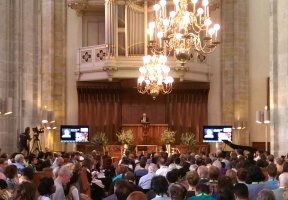
John Powell and Chris Short are currently in Utrecht, Netherlands, at the 16th Biennial Global conference ‘Practicing the commons: Self-governance, cooperation, and institutional change’ of The International Association for the Study of the Commons (IASC).
In his capacity as current President of the IASC , John gave a welcoming address at the opening ceremony of the conference to over 600 scholars and practitioners who have come from all over the world to learn from each other’s research and experiences, to exchange ideas, and to learn from successful examples of management and governance of common-pool resources. This took place in the beautiful setting of St. Martin’s Cathedral (also known as the Dom Church).
The conference is taking place from 10th to 14th July.
John’s address is provided below.
Welcome speech by John Powell at the 16th Biennial Global conference
Difference, indifference, and collaboration
“On behalf of the International Association for the Study of the Commons, I would like to welcome you to Utrecht. This is the 16th biennial conference on the commons that our Association has delivered. That’s three decades of getting people together, from around the world, to explore the resources we share in common. Over that period we have made significant progress, first of all in understanding the nature of commons resources, and secondly in developing the principles that underlie sustainable commons management. These activities were recognised more widely when one of the founders of this Association, Elinor Ostrom, received the Nobel Prize for Economics in 2009. More than anything else, her work showed:
- That local communities can create long-lasting, efficient, and sustainable institutions to manage the resources they share in common
- That there are alternatives to privatisation, or state control, of shared goods and services;
- And, that we can learn from studying the wide range of governance institutions that occur in all parts of the world, and we can apply that understanding to new problems.
The key lesson from her work, is that looking through the conceptual lens of commons, enables us to see a wider range of solutions to many of the resource-allocation problems currently facing society. Members of this organisation are taking those ideas forward and applying them to an ever-widening range of issues including, for example, Global climate change, Marine resources, Water supply, Biodiversity, Genetic resources, Urban spaces, and Knowledge.
New approaches to tackling commons resource problems are influenced by three aspects of human behaviour that colour our thinking and actions: difference, indifference, and collaboration.
Difference – Difference can be something to celebrate, it can enrich our lives, it reflects the myriad ways humans react to their environment, and can be a source of innovation. But Difference can also breed mistrust, especially where change is too quick, or there is a lack of interaction and understanding.
Indifference – Is often the default position when people are faced with problems that they do not understand, or when they perceive their way of life is threatened. For example, we can remain indifferent to others whose lives might be severely impacted by climate change, as long as our own standard of living does not alter. We can even be indifferent to the suffering of those living in the same community, especially if we think of them as ‘different’, or separate in some way. Such attitudes can become institutionalised, influence the way we think, and the way authorities react to problems. We saw an example of this recently in the tower block fire in one of the richest boroughs of central London.
Collaboration – We are social animals, we have an innate ability to work together, and governance of commons is all about learning how to collaborate with others, whether they be in the same street, or on the other side of the planet. Collaboration is the essential ingredient that enables us to share our space, our resources, and our environment.

But collaboration is not an easy option, we have to be willing to monitor activity, impose rules, and enforce them against our neighbours. We also know from our studies of commons, that collaboration requires leadership and coordination, and a more polycentric approach to governance. It requires careful design of institutions that can build on our differences, and overcome indifference. How we do that, how we balance the rights of individuals against the rights of communities, how we make rules about who can access resources, and how we avoid creating large inequalities locally and globally, is the focus of our work.
This week, we are here in the Netherlands to learn from the success of the Dutch people in managing collaborative action. Our conference here in Utrecht focuses on ‘practice’, on ‘cooperation, on ‘collective action’, and ‘self-governance’, which are the central elements for the governance of commons, both old and new, both local and global.
An organisation like ours thrives on the diverse activities of its members, and it is thrilling to see the range of research presentations, practitioner laboratories, and field trips that have been organised for this week. We are here to celebrate difference, to explore how we can overcome indifference, and to analyse and develop new institutional arrangements that enable collaboration. On behalf of the IASC I would like to say, “we are very glad you have come”. There are more than 700 of you here this week from 70 countries, and that in-itself says something about the increasing level of interest in commons. After all – there is no shortage of work ahead of us”.




